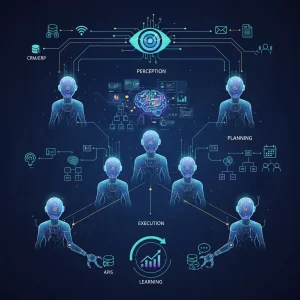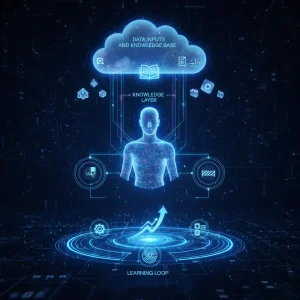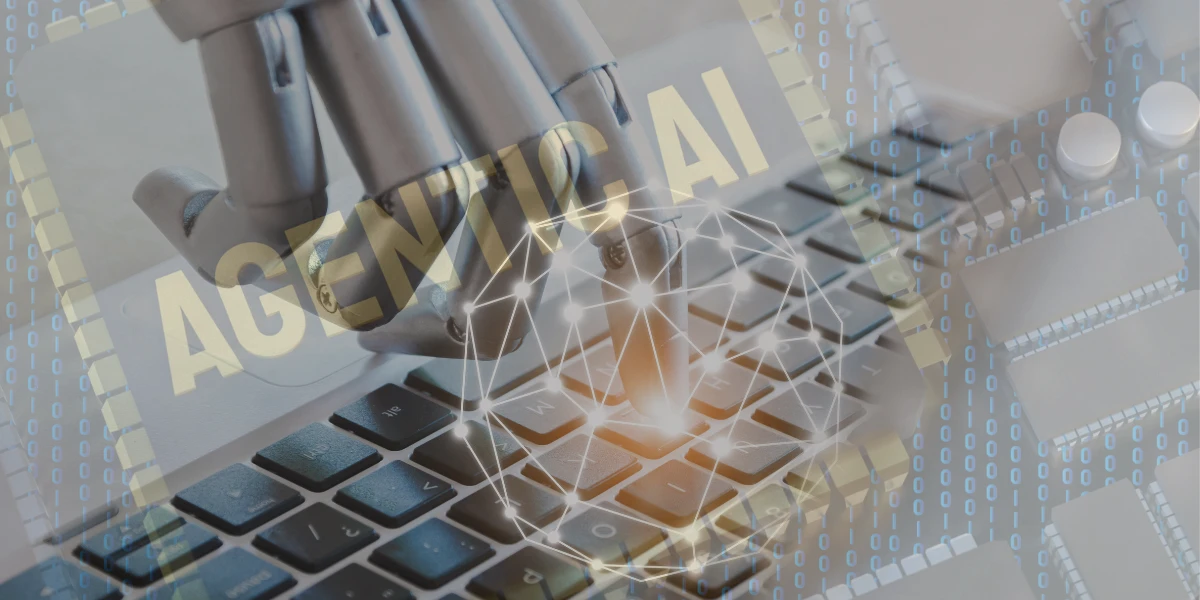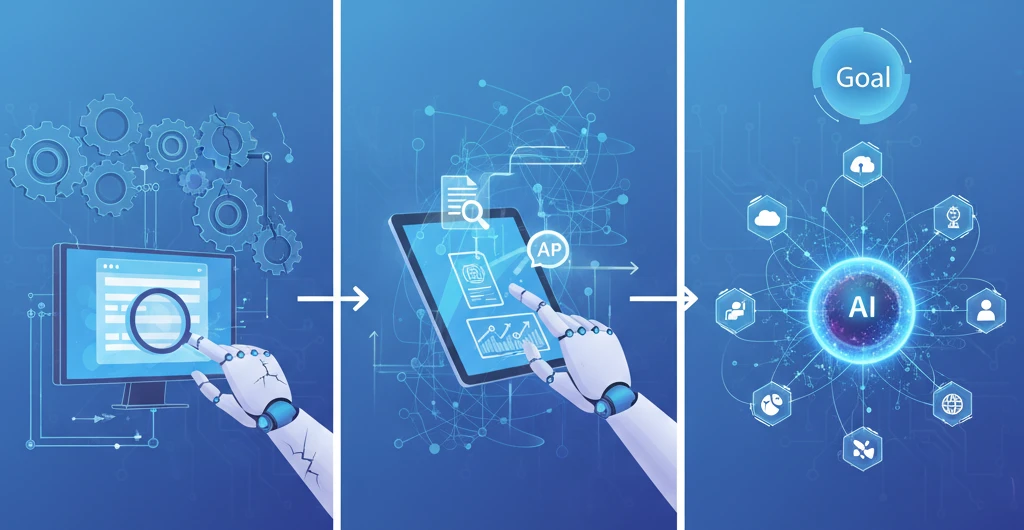Experion Technologies helps enterprises move beyond static scripts to Agentic Process Automation that thinks, plans, and acts. By combining agentic AI, LLM powered autonomous agents, and robust integration patterns, we design agentic workflows that deliver measurable impact across complex operations.
Modern automation has evolved in waves. First came rules and scripts with traditional RPA. Then came intelligent automation where AI and ML added perception, classification, and adaptive branching. Now the frontier is agentic process automation, where AI agents understand goals, reason about context, plan across systems, and execute independently. This is why agentic AI process automation is becoming essential. It replaces brittle procedures with resilient, ai-driven automation that adapts to change and optimizes for outcomes.
Evolution of Automation: From Rules to Autonomy
Traditional Automation vs Intelligent Automation
Traditional RPA focused on repeatable actions inside stable interfaces. It excelled at screen scraping, form filling, reconciliations, and simple handoffs. The limitation was fragility. If a field moved or an exception occurred, the run failed.
Intelligent automation layered in AI and ML to interpret documents, classify intents, and route exceptions. Vision models recognized invoices. NLP summarized emails. Scoring models flagged anomalies. This reduced breakage and extended coverage, but most flows still followed static paths. The system reacted to triggers rather than pursuing higher-level goals.
The Agentic Leap
Agentic automation brings a different paradigm. Instead of executing a script, an AI agent accepts an objective, evaluates constraints, decomposes the work, and chooses the best path. It coordinates tools, calls APIs, and collaborates with people to close the loop. The mindset shifts from “follow this procedure” to “achieve this result.” That is the step from scripted tasks to goal-driven outcomes, and it is the essence of agentic AI automation for enterprises.
Move from automation to autonomy, build your future with Experion
What is Agentic Process Automation?
 Agentic Process Automation is a model of ai process automation where autonomous AI agents handle complex workflows end to end. These agents can perceive signals, reason over knowledge, plan multi-step activities, execute actions, and learn from feedback. They operate across a multi agent system, where specialized agents cooperate to complete a business objective with minimal human intervention.
Agentic Process Automation is a model of ai process automation where autonomous AI agents handle complex workflows end to end. These agents can perceive signals, reason over knowledge, plan multi-step activities, execute actions, and learn from feedback. They operate across a multi agent system, where specialized agents cooperate to complete a business objective with minimal human intervention.
Agentic systems embrace four capabilities that elevate them beyond earlier waves of automation:
- Perception
Agents ingest structured and unstructured signals from CRMs, ERPs, emails, chats, documents, IoT, and data lakes. Vision models, NLP, and retrieval pipelines translate raw inputs into machine-usable context. - Reasoning
Agents use LLMs with tool use, knowledge retrieval, and symbolic planners to weigh options. Reasoning chains allow the system to choose paths, justify decisions, and request missing inputs. - Planning
Agents break goals into subgoals, schedule tasks, and assign work to other agents or systems. This enables parallelization, retries, and dynamic replans when conditions change. - Execution and Learning
Agents call APIs, trigger integrations, update records, and converse with humans when needed. Telemetry and outcome data feed self-optimization so performance improves continuously.
This foundation allows agentic AI workflows to handle variability, recover from errors, and generalize to adjacent use cases without rewriting scripts.
Architecture of Agentic Process Automation
A reference agentic AI architecture typically includes:

- Data Inputs and Knowledge Base
Connectors for SaaS apps, enterprise systems, cloud APIs, document repositories, and IoT streams. A governed knowledge layer supports retrieval augmented generation, policy rules, and enterprise glossaries. - Reasoning and Decision Layers
LLM powered autonomous agents with tool orchestration, retrieval, guardrails, and policy checks. Planners evaluate alternatives, run simulations, and select actions aligned to business constraints. - Task Execution and Learning Loops
Orchestration for workflows, queues, and transactions. Observability captures results, latencies, and errors. Feedback loops tune prompts, tools, and policies to improve precision and reliability over time.
This stack supports single agents, swarms, or a multi agent system where specialists coordinate. It also aligns with a modern automation strategy that blends agentic AI with existing intelligent automation assets.
How It Differs from Existing Automation?
- Autonomy
Classic bots wait for triggers. Agentic AI automation pursues goals, seeks missing context, and adapts when steps fail. It is proactive rather than reactive. - Context Awareness
Rule bots follow fixed flows. Agentic systems use retrieval, memory, and reasoning to understand intent, policy, and history. That context drives better choices. - Continuous Learning
Static scripts degrade over time. Agentic AI process automation improves through telemetry, human feedback, and reinforcement. The more it runs, the better it performs.
Key Components of Agentic AI Automation

Building Blocks of Intelligent, Autonomous Enterprise Workflows
Agentic Process Automation (APA) is built on a layered ecosystem of technologies and principles that enable systems to perceive, reason, plan, and execute with minimal human input. These systems combine agentic AI automation, LLM powered autonomous agents, and intelligent automation techniques to create adaptive, scalable enterprise solutions. Each component plays a critical role in achieving continuous learning and contextual decision-making.
- Intelligent Agents
At the heart of agentic AI automation for enterprise are intelligent agents, self-sufficient software entities designed to accomplish specific tasks. These agents use perception and reasoning to interpret inputs, make decisions, and act. For instance, one agent might handle data retrieval from a CRM, another might analyze it using an AI-driven automation model, and a third might prepare reports or trigger external actions.
In an enterprise setting, these AI agents collaborate in a multi agent system (MAS), each possessing specialized capabilities but working toward shared goals. This architecture makes workflows dynamic, distributed, and resilient, allowing enterprises to scale automation horizontally without rigid dependencies.
- Cognitive Workflows
Unlike traditional automation scripts, agentic workflows replicate human-like thinking patterns. They can understand context, assess priorities, and select paths to achieve the desired outcome. Agentic AI workflows are designed not as static sequences but as adaptive cognitive systems.
This cognitive intelligence enables the automation of complex decision-making processes, such as determining loan eligibility, predicting equipment failures, or managing supply chain logistics. By blending context awareness with reasoning capabilities, agentic AI process automation can execute operations previously limited to human judgment.
- Self-Optimization
A defining feature of APA is its ability to improve autonomously. Through embedded learning loops, agentic automation captures operational feedback, measures outcomes, and adjusts future behavior accordingly.
For example, in a financial institution, if an AI agent detects recurring transaction anomalies that were incorrectly flagged, it can update its model parameters to reduce false positives. This continuous refinement ensures that systems remain relevant even as business data and workflows evolve. Over time, agentic AI automation becomes faster, more accurate, and more contextually aware.
- Collaboration Layer
Modern enterprises require humans and machines to operate as partners. The collaboration layer in agentic ai automation for enterprises bridges this interaction. Agents can communicate via natural language interfaces, ask for clarification, or request approval for high-impact decisions.
Moreover, this layer allows agents to coordinate with other enterprise systems like ERP, CRM, HRMS, and data warehouses. By integrating ai agents automation solutions manufacturing or customer service workflows, APA enables truly connected ecosystems that eliminate silos and foster cross-functional intelligence.
- Integration Engines
Behind the seamless functioning of agentic AI architecture lies a robust integration layer. This connects enterprise platforms, cloud services, and third-party APIs. These integration engines ensure that agentic systems can trigger workflows in Salesforce, update data in SAP, or fetch insights from Azure and AWS environments.
When designed well, integration ensures continuity between agentic ai systems and traditional intelligent automation tools, allowing businesses to modernize incrementally rather than overhaul existing systems.
- Security and Governance Layers
Autonomy introduces responsibility. AI process automation systems must operate within strict compliance frameworks. The governance layer monitors agent activities, enforces data access policies, and ensures accountability.
Security mechanisms such as encryption, audit trails, and role-based permissions protect sensitive enterprise data. Additionally, the governance layer enables transparency, a key differentiator between safe agentic ai automation and unregulated autonomy.
How Agentic Automation Works?

From Goal Definition to Self-Improvement
At its core, agentic AI process automation operates through a closed-loop lifecycle where AI agents define goals, interpret context, plan actions, execute workflows, and learn continuously from results. This is not a linear pipeline but a feedback-driven system that improves with every iteration.
- Goal Definition
Every agentic system begins with an objective, such as processing insurance claims, optimizing manufacturing output, or managing customer onboarding. These goals are defined in natural language and converted into structured representations through LLM powered autonomous agents.
Unlike rule-based automation, which relies on explicit step-by-step instructions, agentic systems can understand what needs to be achieved and determine how to do it.
- Context Understanding
Using natural language processing, vector databases, and knowledge retrieval systems, agents interpret both structured data (e.g., CRM records, IoT telemetry) and unstructured data (e.g., emails, PDFs, chat logs). This allows agentic ai systems to understand context, detect dependencies, and avoid redundant actions.
For example, in ai agents automation solutions manufacturing, an agent can read maintenance logs, compare them with sensor data, and decide whether a machine requires servicing, without human intervention.
- Task Planning and Delegation
Once context is established, agents decompose complex goals into sub-tasks. They prioritize actions based on impact, resource availability, and business logic. This multi agent system coordination ensures efficiency and fault tolerance.
In a agentic ai automation for enterprise setup, one agent might fetch analytics from a data warehouse while another validates compliance documentation. The agentic workflows framework then orchestrates these actions into a unified process, minimizing latency and maximizing throughput.
- Execution and Monitoring
Agents perform the defined tasks by interacting directly with enterprise systems, APIs, and users. The monitoring subsystem tracks metrics such as completion rate, accuracy, and turnaround time.
In ai logistics software or customer service automation, agents can update inventory, resolve tickets, or even communicate status updates autonomously. Continuous observability ensures that each task aligns with business KPIs and regulatory requirements.
- Feedback and Self-Improvement
After execution, the agent evaluates the outcome. Did the action achieve the intended result? What patterns led to success or failure? Using reinforcement learning and historical feedback, agentic ai process automation systems adjust internal parameters to improve next time.
This self-correcting behavior transforms automation from a one-time implementation into a living, evolving system. The more an agentic ai system operates, the smarter it becomes, learning business preferences, user behaviors, and operational nuances.
- The Role of LLMs and Generative AI
Large language models play a critical role in bridging human communication and machine logic. LLMs allow agentic ai workflows to interpret natural language instructions, summarize findings, or generate recommendations.
When combined with generative AI, these agents can draft responses, create documentation, or simulate future scenarios, turning ai-driven automation into a truly collaborative intelligence layer. This human-like reasoning capability is what differentiates agentic ai process automation from any automation technology that came before it.
Reimagine workflows, redefine intelligence, start your agentic automation journey today
Real-World Applications of Agentic AI Process Automation for Enterprises
Transforming Workflows Across Industries with Cognitive Autonomy
The rise of agentic AI process automation is redefining how industries approach efficiency, scalability, and intelligence. By combining AI agents, reasoning models, and cognitive feedback loops, enterprises are moving from static automation to dynamic ecosystems that think, decide, and evolve.
- Finance: Smarter Compliance, Fraud Detection, and Risk Monitoring
Financial institutions are at the forefront of adopting agentic AI automation for managing high-volume, high-stakes operations. Autonomous AI agents can monitor real-time transaction streams, identify fraud patterns, and ensure regulatory compliance.
Instead of relying on fixed rules, these agents reason about context, analyzing historical data, user behavior, and external risk indicators. In agentic workflows, compliance tasks like Know Your Customer (KYC) validation, anti-money laundering checks, and regulatory filings can be managed autonomously. This reduces manual overhead while enhancing accuracy and governance.
- Healthcare: Patient-Centric Intelligence
In healthcare, agentic AI automation for enterprises improves care coordination, diagnostics, and administrative efficiency. For example, AI agents can gather patient data from electronic health records (EHRs), insurance databases, and wearable devices to create comprehensive health summaries for clinicians.
Beyond data consolidation, agentic AI workflows can assist in medical coding, claims processing, and predictive diagnostics. The result is improved accuracy, faster response times, and enhanced patient outcomes. Experion’s deep domain expertise in digital health ensures that these intelligent workflows remain secure, HIPAA-compliant, and patient-focused.
- Manufacturing: Predictive Maintenance and Process Optimization
AI agents automation solutions manufacturing are helping enterprises anticipate breakdowns, minimize downtime, and streamline operations. By integrating machine learning logistics data with sensor analytics, agents can detect anomalies before they become failures.
These agents analyze temperature, vibration, and production data, recommending corrective actions or automatically scheduling maintenance. The result is optimized production cycles, reduced costs, and greater safety. Over time, agentic AI automation transforms manufacturing floors into intelligent, self-healing ecosystems that sustain peak performance.
- Retail and E-Commerce: Adaptive, Personalized Operations
Retailers are deploying agentic AI workflows to deliver hyper-personalized experiences and smarter inventory management. Agents can track consumer preferences, forecast demand, and dynamically adjust pricing or promotions based on market behavior.
In e-commerce, autonomous AI agents assist with customer service, handle inquiries, and resolve order issues using conversational AI and retrieval-based reasoning. This results in faster resolution times, improved satisfaction, and reduced operational costs.
- IT and Operations: Self-Healing and Proactive Management
In IT environments, agentic process automation powers proactive monitoring and remediation. Agents can detect anomalies, execute root-cause analysis, and trigger corrective actions without human intervention.
For instance, in a cloud infrastructure environment, agents may identify latency in APIs or security threats in real time. By automatically reconfiguring instances or isolating vulnerabilities, agentic AI automation for enterprise ensures resilience and uptime.
Experion Technologies partners with global enterprises to design agentic AI automation frameworks that bring these capabilities to life. From predictive analytics to operational intelligence, we help organizations transition from automation to autonomy.
Benefits and Key Features of Agentic Process Automation
From Efficiency to Intelligence
The benefits of adopting agentic AI automation extend far beyond simple cost savings. These systems deliver operational intelligence, resilience, and continuous innovation.
- Efficiency Gains
By enabling AI-driven automation, enterprises achieve faster and more accurate task execution. Autonomous AI agents reduce the need for manual intervention, freeing human teams to focus on strategy and innovation.
Workflows that once required multiple departments or approvals can now be executed instantly through agentic AI workflows that coordinate systems and decisions in real time.
- Scalability Across Enterprise Environments
Traditional automation often struggles with scaling across complex infrastructures. Agentic automation thrives in distributed environments. Whether managing global logistics, finance, or customer support, autonomous agents adapt dynamically to workload fluctuations.
With cloud-based agentic AI architecture, scalability becomes native. Enterprises can deploy new agents on demand and orchestrate them seamlessly through existing ERP or CRM platforms.
- Decision Accuracy and Contextual Intelligence
Because agentic AI process automation relies on reasoning, not static rules, it consistently improves decision quality. By cross-referencing live data, historical records, and contextual variables, AI agents make nuanced decisions aligned with business logic.
This capability reduces human error and enhances consistency across enterprise operations, critical for industries like healthcare, finance, and logistics where precision defines performance.
- Multi-Agent Collaboration
Enterprises rarely operate in silos, and neither do AI agents. In multi agent systems, agents collaborate to solve problems collectively. For example, in supply chain management, one agent may forecast demand while another optimizes inventory routing and a third ensures regulatory compliance.
This collaboration delivers agility and transparency across the ecosystem, replacing fragmented workflows with unified, intelligent networks.
- Natural Language Understanding
The integration of large language models (LLMs) allows agentic ai automation systems to interact with humans intuitively. Business users can assign goals or clarify exceptions in plain language. The system interprets these requests and executes accordingly, reducing technical complexity and improving accessibility across teams.
- Cost Reduction and Resource Optimization
Enterprises investing in agentic ai automation for enterprises typically see a significant return on investment through reduced downtime, faster processes, and fewer manual errors. Automation across repetitive, high-volume workflows allows human resources to focus on creative and analytical roles that drive innovation.
- Continuous Improvement
The hallmark of agentic ai process automation is its ability to learn continuously. By analyzing outcomes and feedback, these systems self-tune over time, improving efficiency, compliance, and adaptability.
This feedback-driven evolution means enterprises are not just automating processes, they are creating systems that evolve alongside their business.
Challenges and Considerations
- Balancing Autonomy with Accountability
As transformative as agentic AI process automation is, its implementation presents new challenges in data, integration, governance, and culture. Enterprises must address these strategically to ensure sustainable adoption.
- Data Quality and Context Understanding
The success of agentic AI automation depends heavily on data quality and contextual accuracy. AI agents make decisions based on real-time inputs, and inconsistent or incomplete data can lead to errors. Organizations must invest in robust data governance frameworks, ensuring that the information feeding their AI process automation systems is clean, structured, and regularly validated.
- Security and Compliance
With autonomous agents making independent decisions, maintaining security and compliance becomes even more critical. Enterprises must define boundaries, permissions, and oversight mechanisms for agentic AI automation for enterprises. Governance frameworks need to incorporate audit trails, explainability features, and clear accountability models.
Regulatory standards such as GDPR, HIPAA, and ISO 27001 should guide how agentic ai systems manage sensitive data. Building compliance into the core architecture helps maintain trust and transparency.
- Integration Complexity
Deploying agentic automation requires interoperability across legacy systems, cloud platforms, and third-party APIs. Many enterprises struggle with fragmented architectures that were never designed for autonomous communication.
A strategic integration roadmap that connects agentic AI workflows to existing intelligent automation frameworks ensures smoother implementation. This approach avoids costly disruptions while modernizing enterprise infrastructure incrementally.
- Human Oversight and Cultural Change
The move from rule-based automation to agentic ai workflows changes organizational dynamics. Employees need to understand that autonomy enhances productivity rather than replaces human intelligence.
A balanced model of “human-in-the-loop” governance ensures oversight while leveraging automation’s full potential. Training programs, transparent communication, and gradual adoption foster trust and readiness for this paradigm shift.
Turn your operations into a living, learning ecosystem with Experion’s agentic AI solutions
The Future of Agentic Process Automation
From Intelligent Agents to Self-Evolving Enterprises
The evolution of automation is accelerating, and agentic AI process automation represents a pivotal moment in that journey. The future points toward systems that continuously learn, collaborate, and self-optimize across distributed digital ecosystems.
Integration with Multi-Agent Systems (MAS)
The next decade will see a rise in multi agent systems where autonomous AI entities cooperate to solve complex enterprise challenges. These systems will coordinate production lines, financial operations, or logistics networks in real time, exchanging data and insights to optimize performance.
Enterprises adopting agentic ai automation today are laying the groundwork for these future ecosystems where multiple intelligent agents work together seamlessly to achieve business objectives.
Evolution Toward Fully Autonomous Enterprises
As agentic ai automation for enterprise matures, organizations will transition from process-level automation to full operational autonomy. Systems will not just execute workflows but also identify new opportunities for optimization, risk reduction, and innovation.
In such enterprises, agents will predict disruptions, plan contingencies, and even allocate budgets, transforming business models into adaptive, self-managing ecosystems.
Agentic AI in Edge Computing and IoT Environments
With the proliferation of connected devices, agentic ai process automation will expand to the edge. Agents embedded within IoT networks can process data locally, making split-second decisions without relying on cloud latency.
For instance, in ai agents automation solutions manufacturing, local AI agents can detect production anomalies and trigger immediate corrective actions. This decentralization enhances speed, reliability, and efficiency across industrial operations.
Democratization of Automation through No-Code AI Tools
The future of agentic ai is not limited to technical experts. No-code and low-code AI platforms are making ai-driven automation accessible to non-technical users. Business teams will soon be able to deploy their own agentic workflows by defining goals in natural language.
This democratization will accelerate innovation, enabling every department to harness the power of agentic AI architecture without complex programming.
How Businesses Can Get Started with Agentic Workflows?
From Vision to Implementation
Implementing agentic AI process automation requires strategic alignment, technical readiness, and cultural adaptability. A structured approach ensures that automation efforts deliver measurable impact and scale efficiently.
- Assessment: Identify High-Impact Processes
Organizations should begin by assessing workflows that are repetitive, data-intensive, and decision-heavy. Functions like claims processing, supply chain coordination, or IT operations are prime candidates for agentic ai automation.
This stage involves mapping dependencies, identifying automation bottlenecks, and estimating potential ROI.
- Building the Technology Stack
A robust automation strategy begins with selecting the right tools and platforms. Enterprises need a foundation that supports LLM powered autonomous agents, cloud-based orchestration, and API integration.
Partnering with an experienced technology provider like Experion Technologies ensures access to scalable agentic AI automation for enterprises built with security, compliance, and future expansion in mind.
- Pilot Implementation
Before scaling, organizations should pilot agentic ai workflows on targeted processes. These early use cases validate business value, refine configurations, and build stakeholder confidence.
A successful pilot creates momentum for enterprise-wide adoption and provides valuable insights into governance, performance, and ROI measurement.
- Scaling and Governance
Once the pilot proves successful, enterprises can expand agentic ai process automation across departments and regions. A formal governance framework ensures compliance, transparency, and accountability at scale.
It is essential to establish clear oversight policies that define how AI agents interact with humans, data, and systems, balancing autonomy with control.
How Experion Looks into Agentic Process Automation?
Engineering the Future of Autonomous Enterprises
At Experion Technologies, we view agentic process automation as the next evolutionary milestone in digital transformation. Our approach blends deep expertise in intelligent automation, AI-driven automation, and enterprise integration to help organizations build adaptive, self-learning systems.
By combining agentic AI, large language models, and scalable architectures, Experion designs platforms that think, decide, and act, creating measurable value across business operations. We architect agentic ai automation for enterprises that connect strategy to execution, ensuring that every autonomous process aligns with organizational goals and governance requirements.
Our strength lies in translating innovation into impact. From developing ai agents automation solutions manufacturing to implementing agentic ai workflows in healthcare, finance, logistics, and retail, Experion delivers real-world systems that redefine what’s possible in enterprise efficiency.
Each deployment is anchored in our principles of security, scalability, and explainability, ensuring that autonomy always operates within the bounds of compliance and trust. Experion’s agentic AI architecture not only automates processes but also empowers businesses to anticipate challenges, adapt faster, and innovate confidently.
Build the autonomous enterprise of tomorrow, powered by Experion’s agentic AI
Conclusion
From Automation to True Autonomy
Agentic process automation represents the next major leap in enterprise efficiency, adaptability, and intelligence. Unlike traditional automation, which executes defined tasks, agentic AI process automation introduces systems that learn, reason, and improve, driving transformation at both operational and strategic levels.
Enterprises adopting agentic ai automation are not merely optimizing workflows; they are creating living ecosystems that evolve alongside their business goals. By connecting AI agents, data, and decision intelligence, organizations gain the agility to respond to changing markets and the resilience to thrive amid uncertainty.
The transition to agentic ai automation for enterprise is not just about technology; it is about leadership and vision. It calls for a mindset shift from efficiency to intelligence, from isolated automation initiatives to unified, autonomous ecosystems that accelerate innovation across every function.
At Experion Technologies, we help businesses realize this transformation through intelligent design, engineering excellence, and human-centered innovation. Our agentic AI automation solutions bring together the best of LLMs, AI agents, and cognitive architectures to help enterprises move faster, operate smarter, and achieve sustainable growth.
Key Takeaways
- Agentic process automation builds upon RPA and intelligent automation to enable autonomous, goal-oriented workflows.
- Agentic AI automation combines perception, reasoning, planning, and execution through self-learning AI agents.
- Agentic ai workflows enhance decision accuracy, speed, and scalability across enterprise systems.
- A well-architected agentic AI architecture integrates seamlessly with CRMs, ERPs, and cloud APIs.
- AI agents automation solutions manufacturing, healthcare, and finance are delivering real-world impact.
- Agentic AI process automation introduces continuous learning and feedback loops that improve outcomes over time.
- Implementing agentic ai automation for enterprises requires robust governance, data quality, and security frameworks.
- The future of agentic automation lies in multi-agent collaboration, edge intelligence, and democratized no-code AI deployment.
- Experion Technologies helps enterprises build resilient automation ecosystems powered by LLM powered autonomous agents and intelligent orchestration.
Empowering Autonomous Intelligence for a Smarter Tomorrow
At Experion Technologies, we partner with enterprises to design and deploy intelligent automation ecosystems that combine agentic AI, machine learning, and enterprise engineering expertise. Our AI-driven automation solutions transform workflows into dynamic, autonomous systems that scale with your business.
We help organizations move beyond routine automation to build systems that perceive, reason, and act, unlocking new levels of agility, performance, and innovation.
Ready to explore the future of automation?
Partner with Experion Technologies to design a scalable, secure, and intelligent automation strategy powered by agentic AI process automation.


